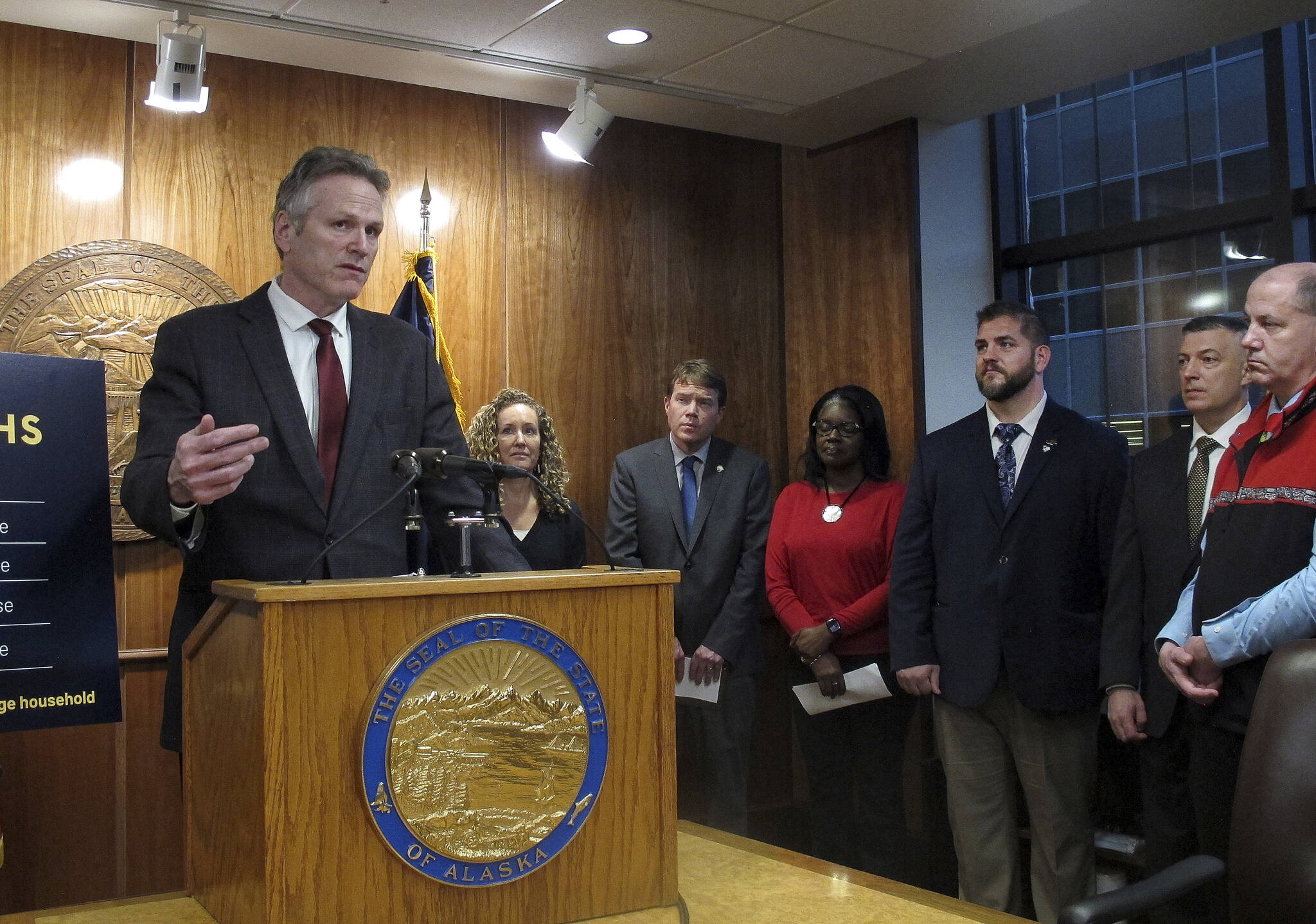An estimated $3,800 dividend, a new Healthy Families Initiative and a bolstering of Alaska’s Statehood Defense Initiative are all included in Gov. Mike Dunleavy’s proposed Fiscal Year 2024 budget, which Dunleavy presented during a Thursday press conference. Fiscal Year 2024 starts on July 1, 2023, and ends on June 30, 2024.
Speaking from the Alaska Capitol Building in Juneau, Dunleavy, joined by state commissioners and members of the media, said the budget proposal is just the beginning of a discussion with the Alaska Legislature about what the package should or should not include. The proposal is subject to approval and change by state lawmakers.
Dunleavy said the budget proposal comes as statewide revenue projections have gone down an estimated $1.8 billion as the price of oil has fluctuated.
“Our FY23 revenue estimates are down $1.8 billion from when I signed the current budget in June,” Dunleavy said Thursday. “As we know, oil prices go up, they go down, especially in the chaotic situation that we have going across the world right now with wars in the Ukraine and policy decisions regarding fossil fuels.”
The budget packet proposed by Dunleavy has a projected deficit of $265 million. To address the deficit, Dunleavy is proposing taking $245 million from the Constitutional Budget Reserve and $20 million from the Statutory Budget Reserve. The combined balance of both accounts is $2.1 billion.
Among the components of the budget proposal Dunleavy highlighted Thursday are $2 million to expand the University of Washington’s WWAMI medical education program, $9.5 million for a Health Families Initiative that will target tuberculosis and congenital syphilis and $3.3 million for 30 new positions in the Department of Public Safety.
Dunleavy in the same press conference touted the monetization of carbon as a potential new revenue source for Alaska and said he plans to introduce legislation that would allow the state to negotiate contracts with private entities.
Dunleavy repeatedly touted the monetization of carbon sequestration as a potential new revenue source for the state and said his administration will introduce a bill that will allow the state to begin contract discussions with private entities. Per the U.S. Geological Survey, carbon sequestration refers to the process of capturing and storing carbon dioxide from the atmosphere.
“When you start off by developing hydrogen … you have to put it somewhere,” Dunleavy said. “The perfect place to put it is in a depleted basin, such as Cook Inlet. We have other depleted bases here in Alaska. As a matter of fact, Alaska probably has more capacity to sequester carbon underground than anywhere on the West Coast.”
Incoming Alaska Sen. President Gary Stevens, R-Kodiak, said in a Thursday press release that the budget proposal “is a good starting point.”
“I do have some concerns with the proposed PFD amount, no additional resources for education funding, a skeleton version of a capital budget, and the possibility we may need a supplemental budget for FY 2023 because of the decline in oil revenues,” Stevens is quoted as saying. “As we go through the process, we will continue to focus on revitalizing Alaska’s economy, improving education, and addressing the state’s high energy costs to provide paths for Alaskans to succeed.”
In a Thursday press release from the Alaska House Republican Caucus, Rep. Ben Carpenter, R-Nikiski, called Dunleavy’s budget proposal “practical” and said it supports private and public economies.
“The reliance on savings to balance the budget points to the continued need for the legislature to address our structural imbalance with long-term fiscal policies that prioritize economic growth, low taxation, and disciplined spending,” Carpenter is quoted as saying in the release.
Fiscal Year 2024 budget documents can be found on the Alaska Office of Management and Budget’s website at omb.alaska.gov. Dunleavy’s full press conference can be streamed on the governor’s YouTube channel.
Reach reporter Ashlyn O’Hara at ashlyn.ohara@peninsulaclarion.com.

